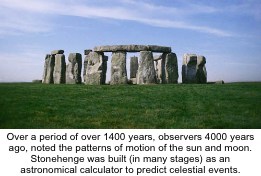 | believe that they can tell us what will happen. The discoveries of science have clearly done more than extend the senses and thereby improve our ability to discern patterns. These discoveries have also enabled us to invent tools that enable us to do what we want to do, whether through the use of computers, lasers, electric motors, or airplanes. Furthermore and very importantly, science has enabled us to construct protective environments that shield us from the ravages of nature. We don't really control nature, but we do have air conditioners, ocean liners and space suits that'rather than change the climate, the ocean or outer space'frequently enable us to live in a protective mini-environment where we do have control. These practical fruits of science'the extension of the senses, the tools, and the mini-environments have really made a huge difference in the way live now compared to the way they lived two hundred years ago. But science has done a lot more than that. It has changed the way we feel about ourselves, and our broad notions of how we fit into nature. Our understanding of the history of the expansion of the universe and the formation of galaxies and stars meshes with our understanding of the evolution of living organisms and of the Earth. All of these form an interconnecting view of change and development. Furthermore, our detailed knowledge of the workings of nature has changed what we fear and the way in which we fear. We no longer think of lightning strokes, earthquakes, or floods as punishments inflicted by angry gods. Such events only rarely have any connection with human behavior. We understand enough about nature that we know how to react to and in some cases protect ourselves from lightning and floods. We certainly do not have to rack our souls trying to determine what we did wrong and why we are being punished. In general, our understanding enables us to simplify our actions and choices because we know in advance which of all the possible reactions we can take are relevant. This simplification of response, this ability to substitute specific fears for vague terrors, can bring to us a sense of peace and order. | ||||
| hearing, sensing motion or detecting molecules have been invented. These have vastly expanded the acuity of our senses, our ability to observe patterns, and therefore our ability to feel a little more secure because we think we know what's going to happen. The people who can do this observing are not necessarily using science to observe patterns. We are all reasonably good pattern recognizers and some of us are uncannily good. Doctors must be very good pattern recognizers; artists are pattern recognizers; the people who watch radar and observe what's happening with airplanes don't have to know any science to discern the patterns of approaching airplanes. So I think scientists on the whole should be a little more humble. They should understand that it isn't their scientific training or knowledge that enables them to predict what's going to happen. If the scientists say that such and such a thing can happen, they may well be right. However, they rarely have any compelling scientific justification for saying that something will happen. I don't think they have any special right to say that. But if they do say it can happen, whether it's a nuclear winter or destruction of the ozone layer, then the public, although it cannot be sure it's going to happen, should nevertheless be alert to this possibility and be prepared to react quickly to prevent it from happening, especially if it is catastrophically irreversible, as is the case with nuclear winter. It is in this sense, I think, science and understanding can provide a real service, but I am really worried by the fact that many scientists too often | |||||